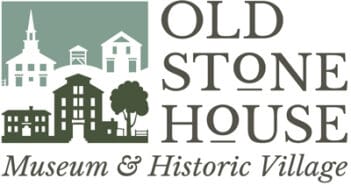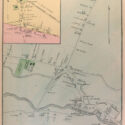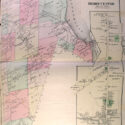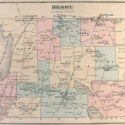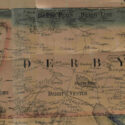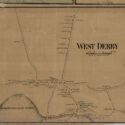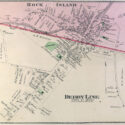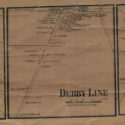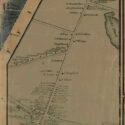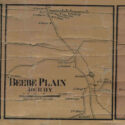Derby Town Facts:
- Granted to Timothy Andrews in 1779
- Named after Derby, Connecticut
- Contains four lakes, largest of which is named Lake Salem at 788-acres
- Two major settlements, Derby Center and Derby Line Derby Line and Beebe Plain is directly on the Canadian border
- The Haskell Free Library and Opera House sits on the border of Canada and the US. Most of the seating in the Opera House is in the US while the stage is on the other side of the border in Canada.
Town History
From the Vermont Historical Gazetteer, edited by Abby Maria Hemenway. Orleans County – Derby Chapter: By E. A. Stewart. Published by Claremont Manufacturing Co, 1877. Pgs 178 – 182.
(Gazetteer Editor’s note: The early history of this town being promised almost two years since, not having, at this date (the compositor being now ready for the manuscripts), come to hand, we can only give here such papers, relating to this town, as have come in already from others than the general historian, and must defer the more complete chapter expected till the Appendix for the County- or the department of county Papers and Items, that either come in too late for a first place in the respective towns, or are otherwise reserved for such summary.)
The temperance question has been a disturbing element in this as in many other churches. An advanced position was taken by the church on this subject at a comparatively early day. In the fore part of 1831, Hon. D. M. Camp, chairman of a committee appointed to consider a communication from the temperance society then existing in Derby, introduced the following resolution at a regular meeting of the church, to wit:
“Resolved That in the opinion of this church the ordinary traffic in spirituous liquors and the use of them as a common beverage, are inconsistent with Christian duty, and contrary to the laws of God, and hereafter shall be punishable the same as other crimes of equal magnitude.”
This resolution was adopted by a vote of 13 to 7. At a subsequent meeting, when a number of the friends of the resolution were absent, a motion was made to rescind the vote adopting the resolution, which was carried by a vote of 11 to 8. The record goes on to say, “From which decision brother D. M. Camp, in behalf of himself and such others of the minority as should see fit to unite with him, appealed, and moved that the [Congregational] church agree with them in the selection of a mutual council to whim the whole might be submitted for advice, and that a committee of three be appointed to act in behalf of the church, which sustained the resolution. Among its members I find the names Amariah Chandler of Hardwick, and A. L. Twilight of Brownington. About ten years later a similar resolution was introduced by Jacob Bates and readily adopted.
In 1842, Mr. Camp also introduced, at church meeting, the following resolutions in regard to slavery, and they were unanimously adopted:
“Whereas the sin of holding our fellowmen in bondage, as exhibited in the Southern States, is now generally acknowledged and deplored by all well informed Christians, and also that the guilt of participation attaches to them so far as they fail to bear decided testimony against it- and whereas, in conformity with the principle involved in this command, ‘Thou shalt not suffer sin upon thy neighbor;’ every Christian becomes to a certain extent the keeper of every brother Christian, and is bound, faithfully but kindly, to tell him of his faults; therefore,
Resolved, That professing Christians who hold their fellow-man in such bondage incur the guilt of violating the law of God- and however in some ages of the world this may have been winked at, all men in this country have now the means of full information, and though they may be ignorant, are entirely without excuse.
Resolved, That while we respect and love our brethren, Christian charity does not require, nor Christian faithfulness permit to cover over or palliate their faults.
Resolved, That this church cannot hold in fellowship those who practice, excuse or tolerate the sin of slavery, nor justify them in coming to the table of the Lord- pretending to obey His commands: and if such profess to be ministers of the gospel we cannot admit them to our pulpit as Christian teachers.
Resolved, That we hold it to be the duty of bodies of associated ministers and private Christians of all denominations in the free States and elsewhere, kindly, but faithfully, to admonish those of the slave States- clearly to point out their danger, and urge them to repentance.”
